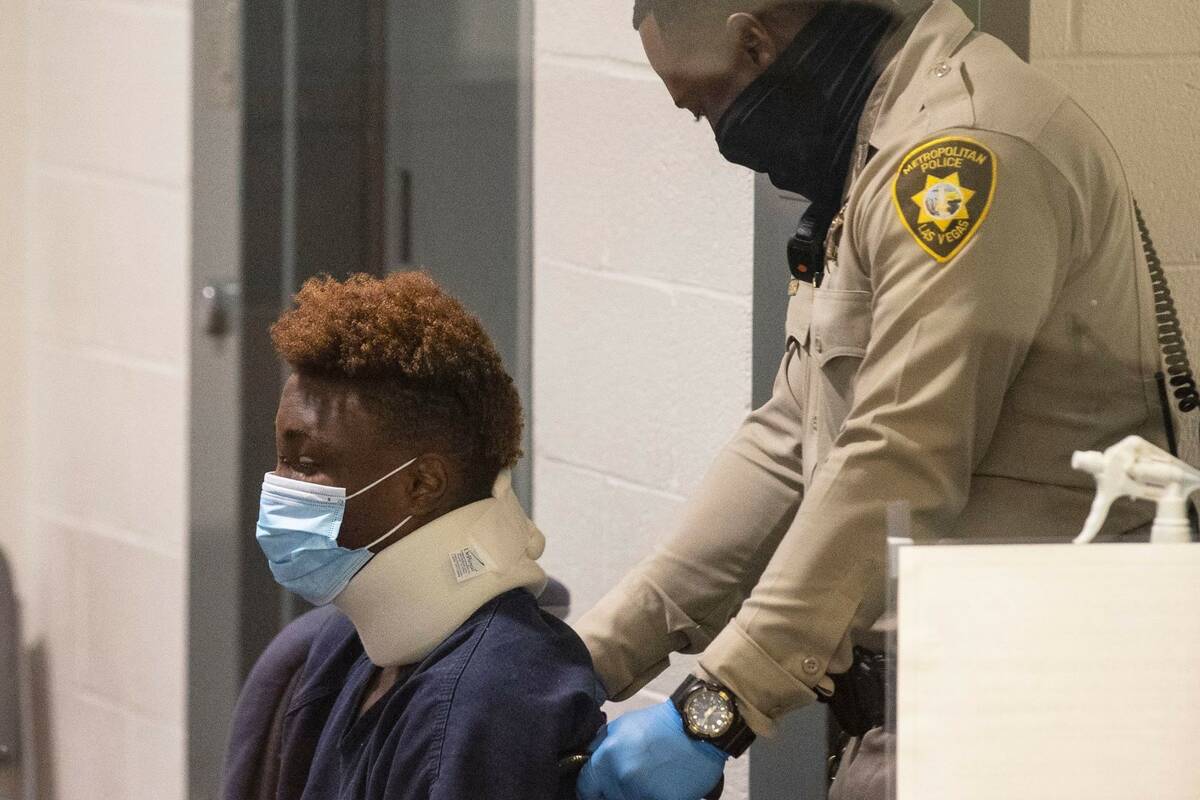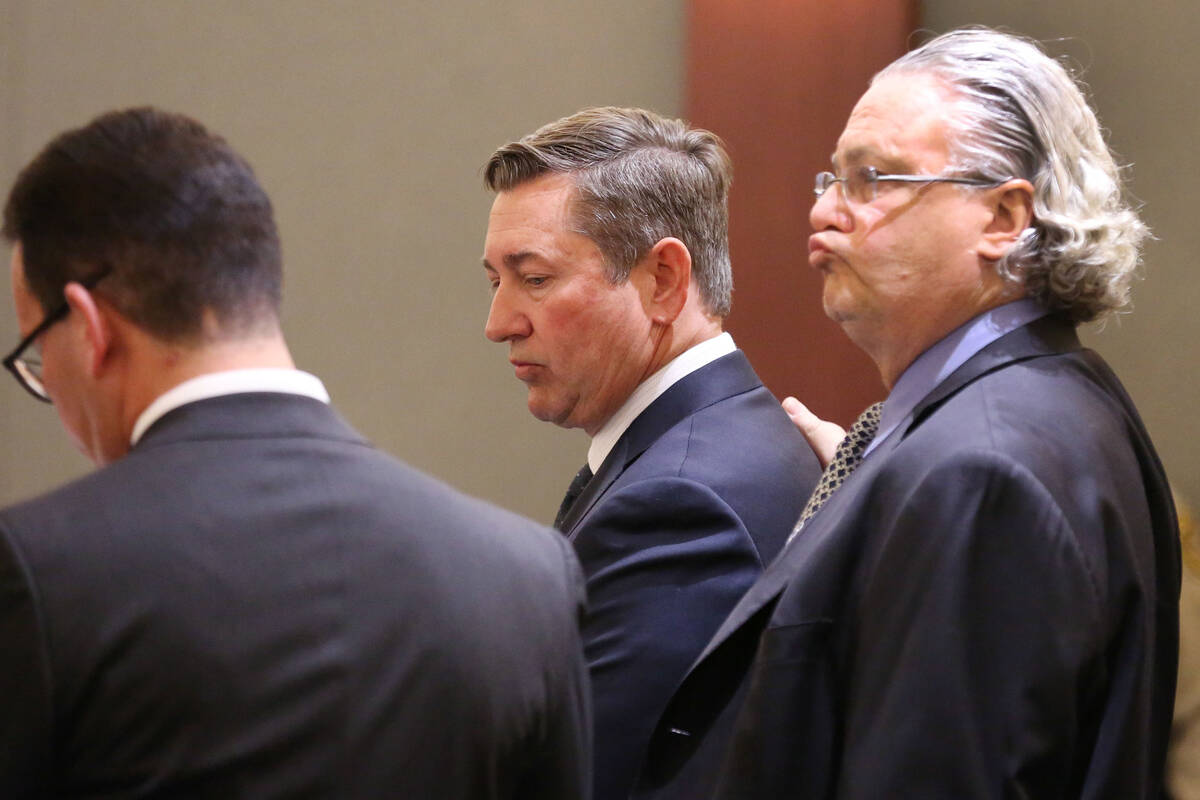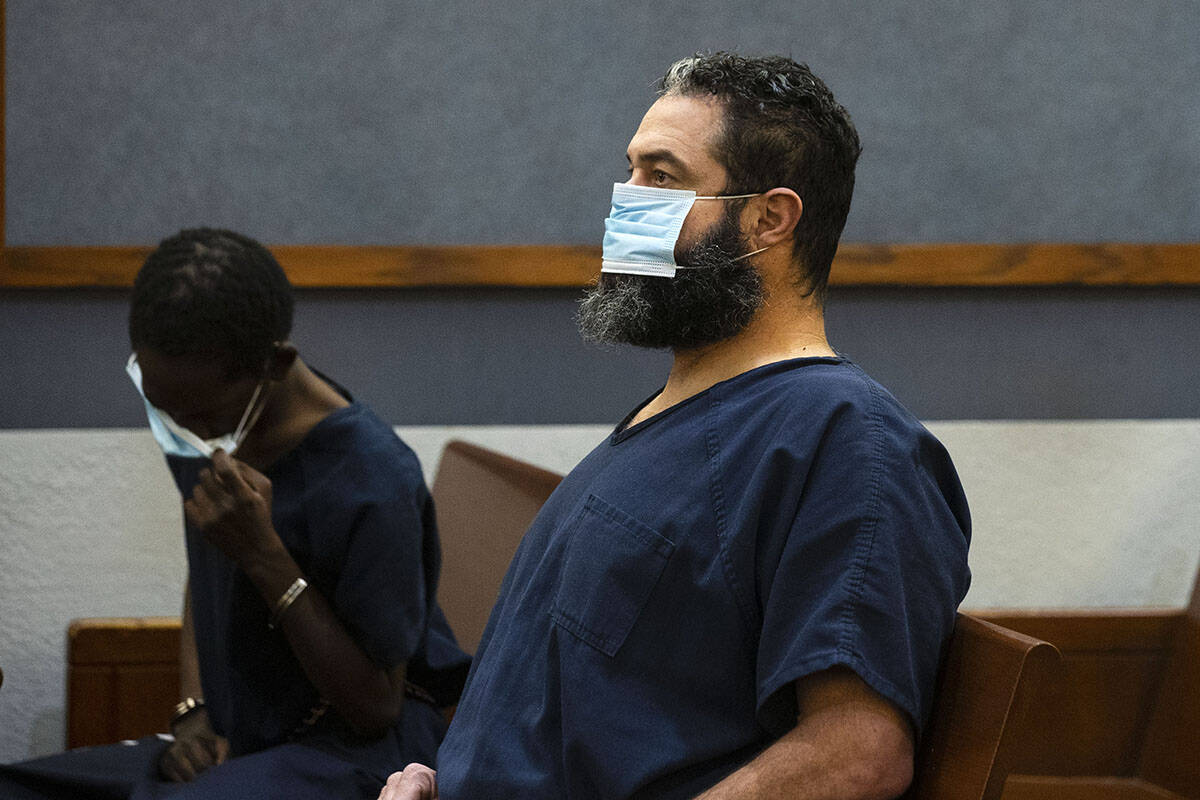In Nevada, a conviction for DUI resulting in death means prison time
Defendants in fatal DUI cases often are sentenced to decades in prison, but they rarely stay incarcerated that long.
“I have generally found that almost all have hit parole once they hit their minimum sentence,” said defense attorney Damian Sheets, who has worked on such cases for about 14 years.
Prosecutors are expected to file formal charges this week against former Raiders standout Henry Ruggs, who could face a maximum sentence of 40 years in prison if convicted of two DUI counts — one for the death of Tina Tintor, and another for injuries his girlfriend suffered in Tuesday’s pre-dawn crash. He could face additional prison time if convicted of reckless driving counts.
Although the minimum sentence for a single charge of DUI resulting in death or substantial bodily harm is two years, others convicted in recent high-profile cases have received minimum terms of six years or more per charge, court records show.
In Nevada, the charge comes with required prison time, meaning if Ruggs is convicted, he would not be eligible for probation. The maximum penalty is 20 years per count.
Sheets said judges often will issue minimum sentences that are more than two years, in part due to the public nature of DUI cases.
“They’re broadcast all over the media,” he said. “They certainly get people angry and people upset. And I think those emotions oftentimes will play on the court.”
Parole in fatal DUI cases
In October 2014, Leonard Novell Walker II was sentenced to seven to 20 years in prison for a North Las Vegas crash that left a 17-year-old mother dead. On Halloween night in 2013, Savannah McInnis was on her way home from trick-or-treating with her 2-year-old son and other family members when Walker hit their 2000 Chrysler sedan.
Investigators said Walker was driving at least 77 mph in a 45 mph zone when he hit the sedan. Walker initially was charged with three counts of DUI resulting in death or substantial bodily harm, but pleaded guilty to only one count, court records show.
Shortly before he reached seven years of incarceration, Walker was granted parole in August 2020, according to Department of Corrections’ records.
Walker’s situation is common, defense attorneys said. Jay “Chip” Siegel, another prominent DUI defense attorney, said he would expect people with fatal DUI convictions to serve at most their minimum sentence. Some could be released earlier through participation in prison treatment programs.
When the Nevada Board of Parole Commissioners decides to give a prisoner parole, factors such as evidence of remorse, criminal history and good behavior in prison can work in the prisoner’s favor. However, the board also considers the seriousness of the crime.
“Unfortunately for high-profile people, the public gets involved, and when you’re trying to get parole, that makes it that much harder,” Siegel said.
Both Siegel and Sheets said their DUI clients tend to receive parole quickly because they often don’t have a criminal history.
High-profile cases
For people convicted of more than one DUI charge, a judge could order their sentences to be served consecutively, raising the minimum amount of time they would spend in prison.
Jordan Barson, who was high on methamphetamine when he crashed a box truck into a group of Las Vegas bicyclists and killed five, initially faced five counts of DUI resulting in death, plus two counts of DUI resulting in substantial bodily harm and seven counts of reckless driving.
He later pleaded guilty to two counts of DUI resulting in death. In June, a judge sentenced him to a minimum of eight years per count, with the sentences served one after the other, meaning he was ordered to spend 16 to 40 years in prison.
About six months before Barson’s sentencing, wealthy Las Vegas real estate broker Scott Gragson was sentenced to half that time in prison. Prosecutors have said Gragson was driving over 80 mph in his neighborhood at The Ridges in Summerlin when he slammed into a tree, killing Melissa Newton, a mother of three, and injuring three others.
Gragson was indicted on one count of DUI resulting in death, three counts of DUI resulting in substantial bodily harm and four counts of reckless driving, but he pleaded guilty to one count of DUI resulting in death and one count of DUI resulting in substantial bodily harm. He was sentenced in September 2020 to a prison term of eight to 20 years.
Sheets, who was one of Barson’s defense attorneys, said he has not noticed judges giving different sentences for DUI crashes involving alcohol versus crashes involving drugs. However, he has seen judges hand out harsher sentences in recent years.
“They’re always emotional. They’re always political,” Sheets said about the sentencing hearings.
Past murder charges
In recent years, prosecutors have brought murder charges against people accused in high-profile DUI cases involving a death, but the Nevada Supreme Court in September 2020 barred the district attorney’s office from engaging in the practice.
Following Ruggs’ court appearance Wednesday, Clark County District Attorney Steve Wolfson told reporters that he respects the Supreme Court decision, but he wants legislators to look at increasing maximum sentences in fatal DUI cases.
“Think about the behavior in this case and so many other felony DUI cases — a person makes a choice minutes or hours before the collision to consume alcohol and then drive recklessly,” Wolfson said. “That person faces a lesser punishment than a person who was convicted of murder, who may decide to kill somebody in just a few moments.”
According to Ruggs’ arrest report, his Chevrolet Corvette Stingray had been speeding up to 156 mph mere seconds before crashing into the back of Tintor’s Toyota RAV4. The SUV burst into flames, killing the 23-year-old woman and her dog. A prosecutor said Ruggs’ blood alcohol level was more than twice the legal limit for drivers in Nevada.
The Raiders released Ruggs, 22, from the team later that evening.
Siegel said DUI cases suggest “a person who should have known better,” but not an intention to kill, which is required for a murder charge.
“I doubt highly (that) Mr. Ruggs was intending to do this. It just doesn’t happen,” Siegel said. “However, it’s alleged that he acted upon a course of conduct that was so dangerous to society, that we could almost see this coming.”
Sheets said he believes fatal DUI cases have become “rigid and unforgiving,” with people unwilling to look at defendants’ individual circumstances.
“There’s a very real difference between murderers and these folks,” he said. “And I think an analysis of the individual is so important.”
Contact Katelyn Newberg at knewberg@reviewjournal.com or 702-383-0240. Follow @k_newberg on Twitter.
Correction: This story has been corrected to indicate that Ciera Brawer was driving the wrong way on the McCarran International Airport connector.
Other fatal DUI cases
Below are the outcomes of several other fatal DUI cases that were prosecuted in Clark County District Court:
— Ciera Brawer was sentenced in February to five to 15 years in prison after pleading guilty to DUI resulting in death. Brawer was driving the wrong way on the McCarran International Airport connector when her Chevrolet Cruze struck 45-year-old Christopher Garcia's car head on.
— Ebone Whitaker was sentenced in November 2020 to 10 to 25 years in prison after pleading guilty to DUI resulting in death and reckless driving. Whitaker had five substances in her system when she lost control of her Mercedes-Benz and struck and killed two teenage girls crossing the street in August 2020.
— Lauren Prescia was sentenced in November 2020 to six to 20 years in prison after pleading guilty to DUI resulting in death and child abuse, neglect or endangerment. Police said Prescia was driving 121 mph when she lost control of her car, causing a crash that killed her infant son.
— David Fensch was sentenced in August 2017 to eight to 20 years in prison after pleading guilty to DUI resulting in death. Fensch, who had four prior DUIs, crashed into the back of Jaelan Fajardo's car while the 16-year-old was at a stoplight, killing the teenager.
— Seong Mo Lee was sentenced in April 2016 to 12 to 30 years in prison after pleading guilty to two counts of DUI resulting in death. Lee was driving his Mercedes-Benz E350 at 117 mph when he crashed into a Nissan Versa, killing two teenagers.




























